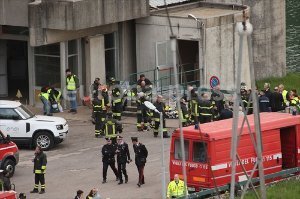In a harrowing incident that has shaken the region, an explosion occurred at a hydroelectric power plant in northern Italy, near Lake Suviana, approximately 70km from Bologna. The disaster, unfolding underwater and 30m below the lake’s surface, has resulted in four fatalities, with several individuals still missing.
A Deadly Blast During Maintenance Work
The explosion took place during routine maintenance work, sparking a fire that complicated rescue efforts. Marco Masinara, the mayor of the nearby town of Camugnano, described the accident as “serious,” highlighting the challenges faced by rescuers in accessing the affected area.
Casualties and Rescue Efforts
Among the casualties, three victims were identified as aged between 35 and 73. The prefect of Bologna, Attilio Visconti, reported that the explosion was caused by a turbine blast on the eighth floor below the surface, leading to extensive flooding and entrapment of workers.
Divers and firefighters have been tirelessly working to reach those trapped and provide medical attention to those with severe burns, some of whom have been transported to intensive care units in nearby hospitals.
A Community in Shock
Bologna Mayor Matteo Lepore expressed his condolences and emphasized the complexity of the search and rescue operations taking place in the depths of the facility, marking it as one of Italy’s worst work-related tragedies in recent history.
Investigations and Workplace Safety Concerns
The incident has prompted an investigation, spearheaded by the city’s chief prosecutor, Giuseppe Amato, who vowed to continue efforts until the missing are found. This tragedy underscores ongoing concerns regarding workplace safety in Italy, with trade unions already calling for a nationwide strike to demand better protections for workers.
The Site of the Disaster
Lake Suviana, an artificial lake created in the 1930s, is now the site of sorrow for the local community and the entire nation. Italian Prime Minister Giorgia Meloni and the Italian energy giant Enel Green Power have extended their gratitude to the rescue services and reassured the public regarding the structural integrity of the dam.
Moving Forward
As the region grapples with the aftermath of this tragedy, the focus remains on supporting the affected families, understanding the circumstances that led to the explosion, and implementing stricter safety measures to prevent future incidents.
This disaster not only highlights the inherent risks associated with industrial work but also serves as a call to action for improving workplace safety standards and ensuring the well-being of workers in Italy and beyond.














































